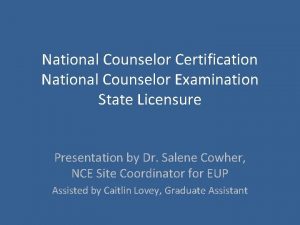Danger Ahead Jeri Jones M Ed School Counselor

















- Slides: 17

Danger Ahead… Jeri Jones, M. Ed. School Counselor Perfectionism

What is Perfectionism? �Perfectionism is wanting everything to be perfect instead of just doing your best. �Perfectionism is also about being overly worried that something won’t be perfect.

What Might Perfectionists Think? If people criticize me it means I’m a loser. I must compete all the time and beat other people. I can’t do anything right so why bother trying. I’m probably just stupid. If I can’t do it perfectly, there’s no point in doing it at all.

Perfectionists Might Believe… I should be the best at everything I do. I am lovable as long as I do things right. If I mess up there’s something wrong with me. Everything is black or white, right or wrong. There is only one good way to do things. If I make an error, people will see I’m not really the best. Things should be done perfectly the very first time.

How Might Perfectionism Feel? Extremely embarrassed about mistakes Afraid of rejection or being left out Nervous about offering opinions Exhausted Can’t seem to relax- “stressed out” Angry with themselves Ashamed Angry with changes to routine Sad Critical of self and others

The Scary Truth � Perfectionists rarely enjoy positive feelings of achievement and satisfaction because they believe that even their best is not good enough. � As a result: ▪ Sadness ▪ Worry ▪ Stomachaches or headaches ▪ Lack of enjoyment ▪ Miss out on new experiences and afraid to try (under performing) ▪ In some cases more serious mental health disorders (anxiety or depression)

The High Achiever: Doing Your Best & Working Hard The high achiever… Wants to do a good job at something. Puts time and energy in to goals. � Realizes they don’t have to excel at everything. � Realizes that helpful critique is not a personal attack. � Looks at mistakes and works to improve next time. � Might be disappointed but remembers all the other things that did go right. � Enjoys feelings of achievement when things go right. � �

Reflection �Do you see the differences between high achieving and perfectionism? What are they? �Take some time today to make a list of all of the good things about YOU. Are you organized, do you care about others, are you creative, musical, punctual, etc?

Becoming a High Achiever ▪ Spend more time with people who encourage you ▪ ▪ to do your best (not perfect). Learn and practice relaxation techniques. Examine the advantages and disadvantages of perfectionism in your own life. Begin to keep a journal of your feelings and thoughts. Practice complimenting other people & finding the good things about them.

Turning Things Around � If other people compare you to someone else do not accept that for yourself; comparing yourself to others is rarely helpful. � Be courageous and try new things. � Learn to focus on the process of reaching the goal, not on the goal itself. � Practice acknowledging mistakes and recognize that this is a natural part of learning. � Practice positive self-talk. **

Positive Self-Talk? � Positive self-talk is a used to replace the negative things we tell ourselves. Practice POSITIVE MESSAGES: � “I am smart, creative, valuable and talented. ” � “I am smart and lovable even when I make mistakes. ” � “I’m acceptable for who I am and not what I do. ”

Reflection � Do you use negative self-talk regularly? How do you feel after you say something negative to yourself? � Come up with some positive statements you can replace for the negative statements. � Good news** When we make positive self-talk a habit our lives can become happier and healthier!

Who Can Help? � An adult you trust who does not encourage perfectionism. � A friend who can encourage healthy habits. � Reading articles or books about changing perfectionism habits. � If you notice that your caregivers encourage perfection in you, perhaps you can share information about perfectionism with them (or ask for help to do this).

Tips for Relaxation � Endorphin rush! (Exercise) � Music � Meditation and progressive muscle relaxation � Adequate sleep- 3 or 4 hours is not adequate for anybody, especially teens � Mindful eating- be aware of sugar and caffeine intake

APPS � Smiling minds � Simply Being � Stress Tracker � Breathe 2 Relax � Many apps are free and a great tool to use for quick relaxation- do a search and see what you come up with!

Final Reflection “Expect progress, not perfection!” ~ Thomas Greenspon, Ph. D. What does this quote mean to you?

References � Davies, Leah, M. Ed. “Perfectionism in Children”. http: //www. kellybear. com/Teacher. Articles/Teacher Tip 53. html � Greenspon, T. S. (2007). What to Do When Good Enough Isn’t Good Enough: The Real Deal on Perfectionism. Freespirit publishing. � Ginsburg, Kenneth. , M. D. , M. S. Ed. “The Toxic Race to Perfection is Damaging Our Teens” Oct. 22, 2011, Psychology Today. � Braiker, Harriet B. “The Power of Self-Talk”, December 1989, Psychology Today.
 School counselor and principal relationship
School counselor and principal relationship School counselors as leaders
School counselors as leaders School counselor certification washington state
School counselor certification washington state Washington school counselor association
Washington school counselor association School counselor roles
School counselor roles Linda metcalf solution focused
Linda metcalf solution focused Virginia school counselor association
Virginia school counselor association School counselor corps grant
School counselor corps grant Missouri comprehensive guidance and counseling program
Missouri comprehensive guidance and counseling program Sejarah falsafah pendidikan kebangsaan
Sejarah falsafah pendidikan kebangsaan Domain kurikulum
Domain kurikulum Jeri elster
Jeri elster Disney cruise youth activities counselor
Disney cruise youth activities counselor Lorraine griscavage-frisbee
Lorraine griscavage-frisbee Bruin online vpn
Bruin online vpn Special education counselor
Special education counselor Camp olympia counselor
Camp olympia counselor Ics academic year plan
Ics academic year plan

































